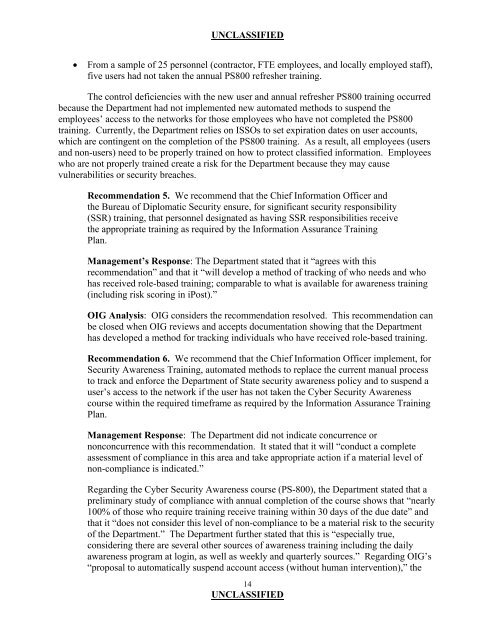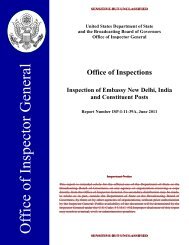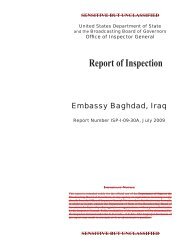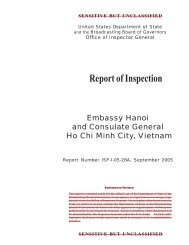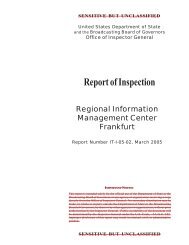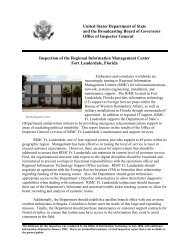Evaluation of Department of State Information Security Program ...
Evaluation of Department of State Information Security Program ...
Evaluation of Department of State Information Security Program ...
You also want an ePaper? Increase the reach of your titles
YUMPU automatically turns print PDFs into web optimized ePapers that Google loves.
UNCLASSIFIED<br />
� From a sample <strong>of</strong> 25 personnel (contractor, FTE employees, and locally employed staff),<br />
five users had not taken the annual PS800 refresher training.<br />
The control deficiencies with the new user and annual refresher PS800 training occurred<br />
because the <strong>Department</strong> had not implemented new automated methods to suspend the<br />
employees’ access to the networks for those employees who have not completed the PS800<br />
training. Currently, the <strong>Department</strong> relies on ISSOs to set expiration dates on user accounts,<br />
which are contingent on the completion <strong>of</strong> the PS800 training. As a result, all employees (users<br />
and non-users) need to be properly trained on how to protect classified information. Employees<br />
who are not properly trained create a risk for the <strong>Department</strong> because they may cause<br />
vulnerabilities or security breaches.<br />
Recommendation 5. We recommend that the Chief <strong>Information</strong> Officer and<br />
the Bureau <strong>of</strong> Diplomatic <strong>Security</strong> ensure, for significant security responsibility<br />
(SSR) training, that personnel designated as having SSR responsibilities receive<br />
the appropriate training as required by the <strong>Information</strong> Assurance Training<br />
Plan.<br />
Management’s Response: The <strong>Department</strong> stated that it “agrees with this<br />
recommendation” and that it “will develop a method <strong>of</strong> tracking <strong>of</strong> who needs and who<br />
has received role-based training; comparable to what is available for awareness training<br />
(including risk scoring in iPost).”<br />
OIG Analysis: OIG considers the recommendation resolved. This recommendation can<br />
be closed when OIG reviews and accepts documentation showing that the <strong>Department</strong><br />
has developed a method for tracking individuals who have received role-based training.<br />
Recommendation 6. We recommend that the Chief <strong>Information</strong> Officer implement, for<br />
<strong>Security</strong> Awareness Training, automated methods to replace the current manual process<br />
to track and enforce the <strong>Department</strong> <strong>of</strong> <strong>State</strong> security awareness policy and to suspend a<br />
user’s access to the network if the user has not taken the Cyber <strong>Security</strong> Awareness<br />
course within the required timeframe as required by the <strong>Information</strong> Assurance Training<br />
Plan.<br />
Management Response: The <strong>Department</strong> did not indicate concurrence or<br />
nonconcurrence with this recommendation. It stated that it will “conduct a complete<br />
assessment <strong>of</strong> compliance in this area and take appropriate action if a material level <strong>of</strong><br />
non-compliance is indicated.”<br />
Regarding the Cyber <strong>Security</strong> Awareness course (PS-800), the <strong>Department</strong> stated that a<br />
preliminary study <strong>of</strong> compliance with annual completion <strong>of</strong> the course shows that “nearly<br />
100% <strong>of</strong> those who require training receive training within 30 days <strong>of</strong> the due date” and<br />
that it “does not consider this level <strong>of</strong> non-compliance to be a material risk to the security<br />
<strong>of</strong> the <strong>Department</strong>.” The <strong>Department</strong> further stated that this is “especially true,<br />
considering there are several other sources <strong>of</strong> awareness training including the daily<br />
awareness program at login, as well as weekly and quarterly sources.” Regarding OIG’s<br />
“proposal to automatically suspend account access (without human intervention),” the<br />
14<br />
UNCLASSIFIED


